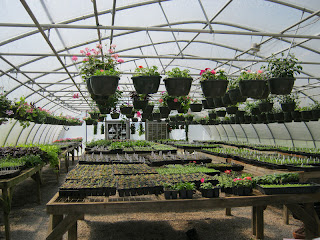 It has been a very busy few weeks here in David, KY with
lots of things starting up due in part to the Vision Planning on Sustainable
Agriculture hosted by St Vincent Mission the end of March. I attended a great
meeting of people interested in the Floyd County Farmer’s Market at the
Extension Office. The market manager is Todd Howard, the mentor for our Green
House Mentoring Program with the David School students. Todd called the meeting
to get some input from producers and consumers so that the Farmer’s Market
members can make decisions as to date, time and place for the third year of the
market. While only one new producer came to the meeting, there were several
consumers who were willing to start a “Friends of the Market” group and one
person who came as a consumer and decided that she might be able to grow enough
on her property to sell.
It has been a very busy few weeks here in David, KY with
lots of things starting up due in part to the Vision Planning on Sustainable
Agriculture hosted by St Vincent Mission the end of March. I attended a great
meeting of people interested in the Floyd County Farmer’s Market at the
Extension Office. The market manager is Todd Howard, the mentor for our Green
House Mentoring Program with the David School students. Todd called the meeting
to get some input from producers and consumers so that the Farmer’s Market
members can make decisions as to date, time and place for the third year of the
market. While only one new producer came to the meeting, there were several
consumers who were willing to start a “Friends of the Market” group and one
person who came as a consumer and decided that she might be able to grow enough
on her property to sell.
Speaking of growing enough to sell, I did a home visit the
other day with a participant interested in the Farmer’s Market, that was
wonderful. When I met James at the gate to his property, he asked me how long I
had been in Kentucky. I said seven years and he replied, “You ain’t never been
to a place like my place” and off we went to his property in the middle of a
reclaimed strip mine. When we got to the acre he planned on using for his
garden, we got to talking about his soil and what he had been doing to add
organic matter and such. He has put in over 200 pickup truck size loads of
manure and he and his six kids have pulled out several tons of rocks. “They
grow in there” he remarked about the rocks and I have heard that from several
of my gardeners.
 |
| Raised beds are probably not deep enough to store these cabbages. |
What I hadn’t heard before is how his daddy stores cabbages.
James told me that he had plowed the garden spot real deep this time for his cabbages. When I asked him why he said, “to store them”. It seems that when the
cabbages are ready to harvest, his father pulls them out, root and all, digs a
hole where the cabbage was, puts it back in the hole head first, covers it with
plastic, then covers them with dirt leaving the root exposed. James says they
stay good all year and that burying them makes them sweeter. This is one harvesting
method I am going to have to follow up on.





































 It’s spring, and you have worked hard putting in all those precious garden plants only to learn that the threat of frost is on its way. What do you do?
It’s spring, and you have worked hard putting in all those precious garden plants only to learn that the threat of frost is on its way. What do you do?








